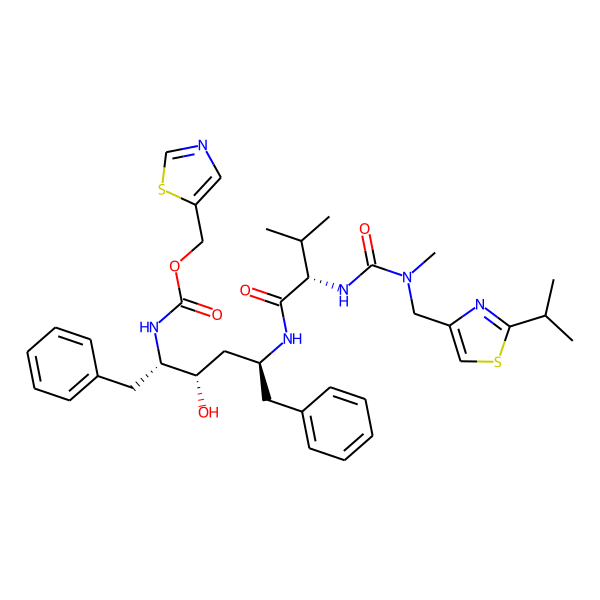Ritonavir
Function
DrugBank ID:
Description:
Ritonavir is an HIV protease inhibitor that interferes with the reproductive cycle of HIV. Although it was initially developed as an independent antiviral agent, it has been shown to possess advantageous properties in combination regimens with low-dose ritonavir and other protease inhibitors. It is now more commonly used as a booster of other protease inhibitors and is available in both liquid formulation and as capsules.While ritonavir is not an active antiviral agent against hepatitis C virus (HCV) infection, it is added in combination therapies indicated for treatment of HCV infections as a booster. Ritonavir is a potent CYP3A inhibitor that increases peak and trough plasma drug concentrations of other protease inhibitors such asParitaprevirand overall drug exposure. American Association for the Study of Liver Diseases (AASLD) and the Infectious Diseases Society of America (IDSA) guidelines recommend ritonavir-boosted combination therapies as a first-line therapy for HCV Genotype 1a/b and 4 treatment-naïve patients with or without cirrhosis.Ritonavir is found in a fixed-dose combination product withOmbitasvir,Dasabuvir, andParitapreviras the FDA-approved product Viekira Pak. First approved in December 2014, Viekira Pak is indicated for the treatment of HCV genotype 1b without cirrhosis or with compensated cirrhosis, and when combined with Ribavirin for the treatment of HCV genotype 1a without cirrhosis or with compensated cirrhosis.Ritonavir is also available as a fixed-dose combination product withOmbitasvirandParitapreviras the FDA- and Health Canada-approved product Technivie. First approved in July 2015, Technivie is indicated in combination with Ribavirin for the treatment of patients with genotype 4 chronic hepatitis C virus (HCV) infection without cirrhosis or with compensated cirrhosis.In Canada, ritonavir is also available as a fixed-dose combination product withOmbitasvir,Dasabuvir, andParitapreviras the Health Canada-approved, commercially available product Holkira Pak. First approved in January 2015, Holkira Pak is indicated for the treatment of HCV genotype 1b with or without cirrhosis, and when combined with Ribavirin for the treatment of HCV genotype 1a with or without cirrhosis. Inclusion of ritonavir can can select for HIV-1 protease inhibitor resistance-associated substitutions. Any HCV/HIV-1 co-infected patients treated with ritonavir-containing combination therapies should also be on a suppressive antiretroviral drug regimen to reduce the risk of HIV-1 protease inhibitor drug resistance. [DrugBank]
Targets:
Human immunodeficiency virus type 1 protease (Human immunodeficiency virus 1); Nuclear receptor subfamily 1 group I member 2 (Humans) [DrugBank]
Pharmacodynamics:
Ritonavir is a protease inhibitor with activity against Human Immunodeficiency Virus Type 1 (HIV-1). Protease inhibitors block the part of HIV called protease. HIV-1 protease is an enzyme required for the proteolytic cleavage of the viral polyprotein precursors into the individual functional proteins found in infectious HIV-1. Ritonavir binds to the protease active site and inhibits the activity of the enzyme. This inhibition prevents cleavage of the viral polyproteins resulting in the formation of immature non-infectious viral particles. Protease inhibitors are almost always used in combination with at least two other anti-HIV drugs. Modern protease inhibitors require the use of low-dose ritonavir to boost pharmacokinetic exposure through inhibition of metabolism via the cytochrome P450 3A4 enzyme pathway. [DrugBank]
Structures
Docking in target protein
Off-target analysis based on ligand similarity (Homo sapiens)
Step 1 - Target prediction for Ritonavir: SwissTargetPrediction
Tips: Click on the link to jump to the 'SwissTargetPrediction' webserver. Select the species of 'Homo sapiens', and then paste the SMILES of Ritonavir in the SMILES input box.
Step 2 - Blind docking for Ritonavir: CB-Dock
Tips: Click on the link to jump to the 'CB-Dock' webserver. Upload the structure file of target predicted by 'SwissTargetPrediction' and the 2D/3D structure file of Ritonavir to perform blind docking.
